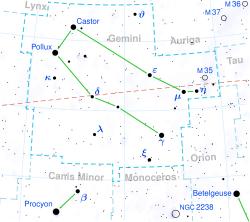ふたご座カッパ星
| ふたご座κ星 κ Geminorum | ||
|---|---|---|
| 星座 | ふたご座 | |
| 見かけの等級 (mv) | 3.57[1] | |
| 位置 元期:J2000.0 | ||
| 赤経 (RA, α) | 07h 44m 26.8535692s[2] | |
| 赤緯 (Dec, δ) | +24° 23′ 52.787227″[2] | |
| 視線速度 (Rv) | 20.37 km/s[3] | |
| 固有運動 (μ) | 赤経: -23.39 ミリ秒/年[2] 赤緯: -54.57 ミリ秒/年[2] | |
| 年周視差 (π) | 23.07 ± 0.22ミリ秒[2] (誤差1%) | |
| 距離 | 141 ± 1 光年[注 1] (43.3 ± 0.4 パーセク[注 1]) | |
| 絶対等級 (MV) | 0.39[3] | |
ふたご座κ星の位置(赤丸)
| ||
| 物理的性質 | ||
| 半径 | 11.00 ± 0.16 R☉[4] | |
| 質量 | 2.58 ± 0.09 M☉[4] | |
| 表面重力 (log g) | 2.7 cgs[5] | |
| 自転速度 | 3.3 km/s[6] | |
| スペクトル分類 | G8 III[1] | |
| 光度 | 69.3 ± 3.7 L☉[4] | |
| 有効温度 (Teff) | 5,020 ± 68 K[4] | |
| 色指数 (B-V) | 0.932[1] | |
| 色指数 (V-I) | 0.90[1] | |
| 金属量[Fe/H] | 0.02[4] | |
| 年齢 | 5.8 ± 0.8 ×108 年[4] | |
| 軌道要素と性質 | ||
| 軌道長半径 (a) | ≥ 1.582 ± 0.752 ×1011 m[3] | |
| 離心率 (e) | 0.71 ± 0.15[3] | |
| 軌道周期 | 4,259.2 ± 58.5 日[3] | |
| 他のカタログでの名称 | ||
| ふたご座77番星[2], ADS 6321[7], BD+24 1759, FK5 294, HD 62345, HIP 37740, HR 2985, IRC +20188, SAO 79653, STT 179[2] | ||
| ■Template (■ノート ■解説) ■Project | ||
ふたご座κ星(ふたござカッパせい、κ Geminorum、κ Gem)は、ふたご座にある連星である[8]。見かけの等級は3.57と、肉眼でみえる明るさである[1]。年周視差に基づいて太陽からの距離を計算すると、およそ141光年である[2][注 1]。
位置
[編集]ふたご座κ星は、ふたご座の1等星ポルックスからみてほぼ真南の方向で、ポルックスとカストルとの間と同程度の離角にあり、4等星としては明るい方なので、みつけやすい恒星である[8]。ふたご座の題材であるカストルとポルックスのうち、ポルックスの肩の辺りに位置する[9]。
星系
[編集]ふたご座κ星から西南西に約7秒の位置には10等星があり、オットー・フォン・シュトルーヴェによって発見されたとされる[10][11]。ふたご座κ星は、固有運動の変則性から位置天文学的連星と考えられ、7秒離れた対の恒星が、200年近く少しの離角の変化だけで運動を共にしていることから、伴星の候補とされている[12][13][8]。この2つの恒星が真に連星であれば、実際の連星間距離は310 au以上になり、軌道周期は2900年を超えると見積もられる[8]。それとは別に、分光観測による視線速度の追跡からは、小さいものの時間変化がみられ、分光連星である可能性が指摘された[14]。その後、詳細な視線速度曲線が得られると、軌道要素が求められ、軌道周期11.7年、離心率0.71の連星を形成すると考えられる[3]。
主星はG型巨星で、スペクトル型はG8 IIIに分類され、MKスペクトル分類ではG8 III星の標準星とされている[1][15]。質量は太陽の2.6倍、半径は太陽の11倍と見積もられ、太陽の70倍くらいの光度が有効温度5,000 Kの光球から放射していると推定される[4]。年齢は、6億年程度と見積もられている[4]。
名称
[編集]中国では、ふたご座κ星は、財貨としての薪を表し、恐らくは厨房に燃料を供給する役人を意味したとみられる積薪(拼音: )という星官を単独で形成する[16][注 2]。
脚注
[編集]注釈
[編集]出典
[編集]- ^ a b c d e f ESA (1997), The HIPPARCOS and TYCHO catalogues. Astrometric and photometric star catalogues derived from the ESA HIPPARCOS Space Astrometry Mission, ESA SP Series, 1200, Noordwijk, Netherlands: ESA Publications Division, Bibcode: 1997ESASP1200.....E, ISBN 9290923997
- ^ a b c d e f g h “kap Gem -- Double or Multiple Star”. SIMBAD. CDS. 2023年12月14日閲覧。
- ^ a b c d e f Abt, Helmut A. (2019-05), “The Evolutionary Status of GK Subgiants”, Astronomical Journal 157 (5): 177, Bibcode: 2019AJ....157..177A, doi:10.3847/1538-3881/ab11c6
- ^ a b c d e f g h Baines, Ellyn K.; et al. (2018-01), “Fundamental Parameters of 87 Stars from the Navy Precision Optical Interferometer”, Astronomical Journal 155 (1): 30, Bibcode: 2018AJ....155...30B, doi:10.3847/1538-3881/aa9d8b
- ^ Stock, Stephan; Reffert, Sabine; Quirrenbach, Andreas (2018-08), “Precise radial velocities of giant stars. X. Bayesian stellar parameters and evolutionary stages for 372 giant stars from the Lick planet search”, Astronomy & Astrophysics 616, Bibcode: 2018A&A...616A..33S, doi:10.1051/0004-6361/201833111
- ^ Massarotti, Alessandro; et al. (2008-01), “Rotational and radial velocities for a sample of 761 HIPPARCOS giants and the role of binarity”, Astronomical Journal 135 (1): 209-231, Bibcode: 2008AJ....135..209M, doi:10.1088/0004-6256/135/1/209
- ^ Docobo, J. A. (1998-05), “Micrometer measurements of double stars from the Spanish observatories at Calar Alto and Santiago de Compostela”, Astronomy & Astrophysics Supplement Serires 130: 117, Bibcode: 1998A&AS..130..117D, doi:10.1051/aas:1998407
- ^ a b c d Kaler, James B. (2015年11月6日). “KAPPA GEM (Kappa Geminorum)”. Stars. University of Illinois. 2023年12月14日閲覧。
- ^ 山田, 卓『冬の星座博物館』地人書館、東京都新宿区、1985年3月30日、157頁。ISBN 4-8052-0180-0。
- ^ Mason, Brian D.; et al. (2023-09), “The Washington Visual Double Star Catalog”, VizieR On-line Data Catalog: B/wds, Bibcode: 2023yCat....102026M
- ^ Knapp, Wildried R. A.; Nanson, John; Smith, Steven C. (2015-11-01), “STT Doubles with Large Δ M — Part I: Gem” (PDF), Journal of Double Star Observations 11 (4): 390-401
- ^ Kervella, Pierre; et al. (2019-03), “Stellar and substellar companions of nearby stars from Gaia DR2. Binarity from proper motion anomaly”, Astronomy & Astrophysics 623: A72, Bibcode: 2019A&A...623A..72K, doi:10.1051/0004-6361/201834371
- ^ Eggleton, P. P.; Tokovinin, A. A. (2008-09), “A catalogue of multiplicity among bright stellar systems”, Monthly Notices of the Royal Astronomical Society 389 (2): 869-879, Bibcode: 2008MNRAS.389..869E, doi:10.1111/j.1365-2966.2008.13596.x
- ^ Fekel, Francis C. (1997-05), “Rotational Velocities of Late-Type Stars”, Publications of the Astronomical Society of the Pacific 109: 514-523, Bibcode: 1997PASP..109..514F, doi:10.1086/133908
- ^ Johnson, H. L.; Morgan, W. W. (1953-05), “Fundamental stellar photometry for standards of spectral type on the revised system of the Yerkes spectral atlas”, Astrophysical Journal 117 (3): 313-352, Bibcode: 1953ApJ...117..313J, doi:10.1086/145697
- ^ “中國古代的星象系統 (77): 井宿天區” (中国語). AEEA 天文教育資訊網. 國立自然科學博物館 (2006年7月16日). 2023年12月14日閲覧。
- ^ Allen, Richard Hinckley (1899). Star-names and their meanings. New York: G. E. Stechert. p. 237
関連項目
[編集]外部リンク
[編集]- “κ Geminorum”. alcyone software. 2023年12月14日閲覧。

